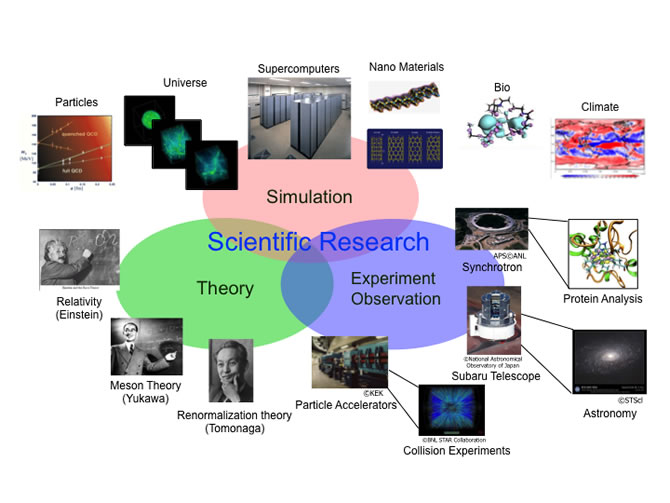
Project Office for Exascale Computational Sciences
Project Office for Exascale Computing System Research and Development
Project Office for HPCI Strategic Program
Project Office for AI & Big Data
Promotion Office for Computational Sciences
Project Office for High Performance Computing System Development and Management
Liaison Office for Multidisciplinary Computational Sciences
Promote society-academia collaboration of computational technologies and simulation programs
Bureau of Public Relations and Strategy
Department of Computational Medical Science
Computational Science
Simply speaking, “computational science”involves using computers to do science. In the past decade, extraordinary advances in science and technology have been achieved as a result of dramatic increases in the power and availability of computers and networks. Most scientific disciplines are benefiting from computer modeling, analysis, and visualization. Computational science has shifted the paradigm of scientific research to include simulation as a fundamental method of science, along with experiment and theory. Computer simulation allows us to acquire scientific insights into problems that are too complex or difficult to study analytically using just “paper and pencil”. It also enables the study of complex systems and natural phenomena that would be too expensive or dangerous, or would even be impossible, to study by direct experimentation. Computation is now regarded as an equal and indispensable partner, along with theory and experiment, for scientific research.
Computational Science, which enables us to explore uncharted fields of science through the application of high-performance computing, is the third paradigm of scientific research and has become indispensable for the development of science and technology in the 21st century. Scientific simulation is expected to contribute to the progress of science and technology in the following fields:
- Simulations to explore the frontiers of fundamental science (i.e.,particle physics and astrophysics)
- Simulations for nano- and bio-materials based on microscopic laws (i.e., quantum mechanics)
- Simulations of macroscopic phenomena involving interactions between nature and human society
- Engineering simulations as a tool for manufacturing “mono-zukuri”

